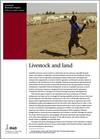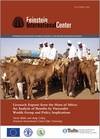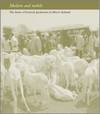This report explores the implications of climate change for pastoralists and agro-pastoralists in Ethiopia and Mali. The focus of the report is on local perceptions of changes in climate shocks and stressors. It examines how people respond to these changes, and what constraints they face. Examining local perceptions and responses to change is important because these can help to identify more precisely what support pastoralists require to strengthen their climate resilience. It will also help identify specific constraints that different actors and groups face, and also uncover a more holistic understanding of adaptation in relation to particular socio-economic, political or historical contexts. Drawing on local perceptions, policy makers will be better informed of the impacts of climate change as they are felt on the ground, the challenges and opportunities that pastoralists face in adjusting their livelihoods, and what further assistance should be provided.
Year of publication: 2010Organization: Auteurs individuels
Topic: Changement climatique, Sécurité alimentaire, Les savoirs autochtones, Peuples autochtones, Résilience
Language: English
Type of document: Technique
Geographical coverage: Afrique occidentale, Afrique orientale
Today there are nearly 200 million pastoralists in the world generating income where conventional farming is limited or not possible. However, pastoral communities are marginalized and generally not given due consideration in wider socio-political analysis. This brief paper presents new challenges and opportunities for pastoralism and key issues and questions in project design.
Year of publication: 2009Organization: Fonds international de développement agricole (FIDA)
Topic: Économie, Organisation, Participation, Résilience, Value addition
Language: English
Type of document: Technique
Geographical coverage: Global
Equitable and secure access to land is a critical factor for the rural poor, especially livestock owners, who depend on agriculture and animal-related activities for their livelihood. This thematic paper is based on the assumption that secure investments in livestock infrastructure and assets can be encouraged by ensuring equitable and secure access to land, and that this approach will help reduce rural poverty. To this end, it identifies experiences and lessons learnt regarding livestock and land-related issues, drawing on experiences from IFAD development projects and programmes all over the world, with a special focus on Africa. It examines the following interrelated issues: livestock and access to land, access to reliable sources of water, encroachment, land degradation, grazing and mobility.
Year of publication: 2009Organization: Fonds international de développement agricole (FIDA)
Topic: Économie, Régime foncier, Value addition
Language: English
Type of document: Technique
Geographical coverage: Afrique du Nord, Afrique occidentale, Afrique centrale, Afrique orientale, Afrique australe
This paper addresses the challenge of educating nomadic peoples in the context of rapid global socio-economic change. First, it maps out the conceptual terrain, analysing the key debates in relation to terms that are often misleadingly used as if they are interchangeable – education, schooling, and learning. Second, the paper reviews successful and innovative approaches to education provision around the world that can inform and inspire new approaches to nomadic education.
Year of publication: 2009Organization: Institut international pour l'environnement et le développement (IIED)
Topic: Éducation
Language: English
Type of document: Scientifique
Geographical coverage: Global
This report examines if and how different wealth groups benefit from the livestock export trade. It looks in detail at the household-level economic strategies of different pastoralist wealth groups and their marketing behaviors. It also explores the apparent contradiction between increasing levels of pastoralist destitution in the Horn of Africa, and increasing exports of livestock and livestock products. The publication concludes that in terms of poverty reduction, poorer herders benefit least from livestock exports.
Year of publication: 2009Organization:
Topic: Économie, Value addition
Language: English
Type of document: Technique
Geographical coverage: Afrique orientale
Cet ouvrage se penche sur le rôle vital que joue l'élevage mobile dans la prospérité économique des zones arides africaines. Le pastoralisme repose sur des stratégies de production uniques, au sein desquelles la faculté de se déplacer joue un rôle essentiel. Un nouveau raisonnement, de nouvelles politiques et des pratiques novatrices en faveur de la mobilité pastorale commencent à s’imposer en bien des points des zones arides d’Afrique. La mobilité de l’élevage est une solution moderne à la réduction de la pauvreté et au développement accéléré des zones arides d'Afrique. Pour soutenir la mobilité, inutile de procéder à des investissements financiers gigantesques : il suffit de raisonner hors des sentiers battus et de chercher à mieux comprendre. Cet ouvrage est un point de départ.
Year of publication: 2009Organization: Institut international pour l'environnement et le développement (IIED)
Topic: Changement climatique, Économie, Sécurité alimentaire, Régime foncier, Résilience, Value addition
Language: English, Français
Type of document: Technique
Geographical coverage: Afrique occidentale, Afrique orientale
This booklet answers the basic questions around pastoralism about its importance and main challenges. It was produced under the Regional Pastoral Livelihoods Advocacy Project (REGLAP).
Year of publication: 2009Organization: Auteurs individuels
Topic: Éducation, Participation
Language: English
Type of document: Technique
Geographical coverage: Global
La mise en œuvre de la Composante « Aménagements pastoraux et organisation de la transhumance transfrontalière » sera conforme à celle du Sous-programme « Gestion améliorée des autres ressources naturelles partagées » du Programme régional d’investissement agricole (PRIA) de la CEDEAO. Pour ce faire, elle adoptera les principes directeurs retenus dans l’ECOWAP, en l’occurrence : le principe de subsidiarité, le principe de proportionnalité, le principe de complémentarité, le principe de régionalité, le principe de solidarité, le principe de partenariat et de concertation et le principe de progressivité.
L’objectif principal de la Composante est de créer les conditions d'une exploitation durable et non conflictuelle des ressources pastorales transfrontalières en vue d'améliorer les conditions de vie des populations. La zone d’intervention couvre les quatre principaux axes de transhumance régionaux identifiés (Axe central, Axe Ouest, Axe Est et Axe Nord-Niger – Nord-Nigeria). Les zones de départ, les pistes et couloirs de transhumance transfrontaliers, les zones de transit et les zones d’accueil des troupeaux transhumants constitueront les zones de concentration de l’intervention.
Year of publication: 2009Organization: Auteurs individuels
Topic: Conflit, Services environnementaux, Régime foncier, Organisation
Language: Français
Type of document: Politiques et législation
Geographical coverage: Afrique occidentale









